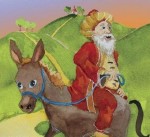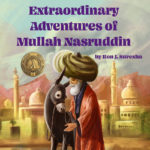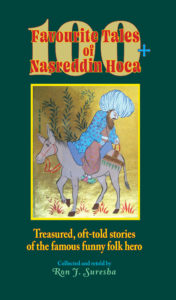Why Nasruddin Rode His Donkey Backward

 One morning, Nasruddin was leading his donkey out from the stable, on his way to teach at the school, for that is another one of the things that Nasruddin did for work in those days. Seeing Nasruddin appear on the street, some young students approached him to ask whether they might instruct them and hear their lessons. Nasruddin readily agreed, and invited them to the schoolhouse.
One morning, Nasruddin was leading his donkey out from the stable, on his way to teach at the school, for that is another one of the things that Nasruddin did for work in those days. Seeing Nasruddin appear on the street, some young students approached him to ask whether they might instruct them and hear their lessons. Nasruddin readily agreed, and invited them to the schoolhouse.
Nasruddin mounted his donkey from the left, put his right foot in the stirrup, and heaved himself up. Naturally this put him facing backward toward the ass’s rear. As they set off, Nasruddin commented, “Remember, kids: a donkey of your own is better than a shared thoroughbred mare.”
As they walked on, Nuri asked why the Mullah mounted his donkey that way.
Nasruddin said, “Because, my child, the donkey is left-handed.”
Ismail objected, “But Mullah, donkeys don’t have hands.”
Nasruddin replied, “Well, left-footed, then,” then nudged Karakacan with a shout — “Ugh-r-r-r,” which, as you might happen to know, is Turkish for “Giddyap!” — and a shove.
“In any case,” Nasruddin continued speaking to the students, “what usually happens is that I want to go in one direction, and this stubborn beast wants to go in the exact opposite way. So this is our compromise.”
. . . to be continued . . .
+
Excerpted from The Uncommon Sense of the Immortal Mullah Nasruddin: Stories, Jests, and Donkey Tales of the Beloved Persian Folk Hero
 Your Daily Nasruddin
Your Daily Nasruddin 
There are few Nasruddin stories as iconic as this one, yet there is no one standard telling for this most basic of Nasruddin jokes. Usually this is explicated before the Hoca’s students, but sometimes villagers or strangers will ask the same question of the Mullah, “Nasruddin — where are you going?”
Several reasons for Nasruddin’s unconventional way of mounting, then riding, his little grey donkey (sometimes it’s a horse) are given among story variants. The most popular reasons are:
~ I mounted the horse this way (backward) because the horse is left-footed (or left-hooved).
~ I’m not the one facing the wrong way — it’s the donkey!
~ The animal and I want to go in opposite directions, so this is our compromise.
~ If I ride my donkey facing backward, I can face my students as they follow me and ask their endless questions.
~ Don’t ask me — ask the beast!
Every Friday on market day, Nasruddin arrived at market with an excellent donkey, which he sold almost immediately, for his prices were far below the usual asking price.
 Your Daily Nasruddin
Your Daily Nasruddin 



Why Nasruddin Rode His Donkey Backward
Why Nasruddin Rode His Donkey Backward
. . . to be continued . . .
+
Excerpted from The Uncommon Sense of the Immortal Mullah Nasruddin: Stories, Jests, and Donkey Tales of the Beloved Persian Folk Hero
There are few Nasruddin stories as iconic as this one, yet there is no one standard telling for this most basic of Nasruddin jokes. Usually this is explicated before the Hoca’s students, but sometimes villagers or strangers will ask the same question of the Mullah, “Nasruddin — where are you going?”
Several reasons for Nasruddin’s unconventional way of mounting, then riding, his little grey donkey (sometimes it’s a horse) are given among story variants. The most popular reasons are:
~ I mounted the horse this way (backward) because the horse is left-footed (or left-hooved).
~ I’m not the one facing the wrong way — it’s the donkey!
~ The animal and I want to go in opposite directions, so this is our compromise.
~ If I ride my donkey facing backward, I can face my students as they follow me and ask their endless questions.
~ Don’t ask me — ask the beast!